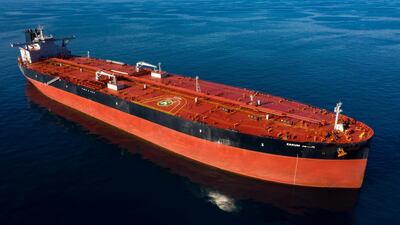Abu Dhabi National Oil Company's shipping and maritime subsidiary is buying two very large crude carriers, bringing the total number of such vessels added to its fleet this year to eight.
The expansion is in line with Adnoc's commitment to raise its overall crude production capacity to 5 million barrels per day by 2030. The acquisition of additional vessels also supports the company's recent launch of Ice Murban crude futures, a premium Abu Dhabi grade that is popular with buyers in Asia.
With the two latest acquisitions, the total crude oil cargo capacity of Adnoc's L&S fleet will rise to 16 million barrels this year.
The acquisition consolidates Adnoc Logistics and Services' "competitive offering" which covers the full spectrum of the oil and gas value chain, said chief executive, Captain Abdulkareem Al Masabi.
"Following our strategic vessel acquisitions in 2020-2021, and combined with our integrated logistics and marine solutions, we are confident that our customers will gain a significant edge in terms of time and cost savings for their upstream and downstream operations, including Adnoc Group entities," he added.
One of the acquisitions, which is newly-built, will run on dual-fuel technology, allowing the vessel to use liquefied natural gas, if needed. LNG as a bunkering fuel is less polluting for the world's oceans and helps reduce emissions by 30 to 40 per cent.
The newly-built vessel will join Adnoc's fleet in the first quarter of 2023, while the other VLCC will be added in the second quarter of this year.
The vessels will each have a length of 336 metres with a deadweight of 300,000 metric tonnes. The newly-built vessel will be manufactured by South Korea's Daewoo, while the second VLCC will be equipped with a scrubber that allows for the removal of toxic sulphur oxides from the ship's engine.
The VLCCs will join an existing fleet of 140 owned vessels and 100 chartered units, which include deep-sea shipping, offshore support and marine services vessels.
Adnoc's shipping arm helps the national oil company transport crude oil, dry bulk products, container cargo, liquefied petroleum gas and LNG to global trading partners.
In an interview with The National earlier this month, Capt Al Masabi said the company was assessing research and development opportunities with global players to improve ways to transport hydrogen.
Hydrogen is considered a clean source of alternative fuel which is growing in popularity.
Globally, the hydrogen industry is expected to grow to $183 billion by 2023, from $129bn in 2017, according to Fitch Solutions. French investment bank Natixis estimates that investments in hydrogen will exceed $300bn by 2030.


